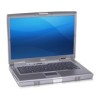Dell Precision M70 User's Guide - Page 71
Power Management
 |
View all Dell Precision M70 manuals
Add to My Manuals
Save this manual to your list of manuals |
Page 71 highlights
Back to Contents Page Power Management Dell Precision™ Mobile Workstation M70 User's Guide Power Management Tips Power Management Wizard Power Management Modes Power Options Properties Power Management Tips NOTE: See "Using a Battery" for more information on conserving battery power. l Connect the computer to an electrical outlet when possible because battery life is largely determined by the number of times the battery is charged. l Place the computer in standby mode or hibernate mode when you leave the computer unattended for long periods of time. l You can use the Power Management Wizard to configure the computer to enter or exit power management modes by pressing the power button, closing the display, or pressing . CAUTION: Your computer features Undock & Go™ technology that allows you to undock your computer without going into Standby Mode. Because the computer may not automatically go into Standby Mode when it is undocked, be sure the settings in the Power Options control panel do not prohibit the computer from going into Standby Mode. If you change the Power Options control panel to prohibit the computer from going into Standby Mode, you greatly increase the chances of causing your battery to wear down quickly or causing your computer to overheat. Power Management Wizard NOTE: The Power Management Wizard is not available if you have restricted access rights. Click or double-click the icon to open the Power Management Wizard. The first two screens of the wizard-Welcome and What is Power Management?-describe and define various power management options. NOTE: On the What is Power Management? screen, you can select Do not show this page again. When you select this option, the Welcome screen also does not appear again. Use the screens that follow Welcome and What is Power Management? to set various power management options, including sleep modes, power schemes, and low battery-charge alarms. Setting Sleep Modes The screen defines standby and hibernate modes. From the screen you can: l Set standby-mode password options. l Enable or disable hibernate mode. l Select how the computer will respond when you close the display: ¡ Choose no action. ¡ Enter standby mode. ¡ Enter hibernate mode. l Select how the computer will respond when you press the power button: ¡ Choose no action. ¡ Enter standby mode. ¡ Enter hibernate mode. ¡ Shut down the operating system and turn off the computer. ¡ Prompt a user for an action (Ask me what to do). l Select how the computer will respond when you press : ¡ Choose no action. ¡ Enter standby mode. ¡ Enter hibernate mode. ¡ Shut down Microsoft Windows and turn off the computer.















